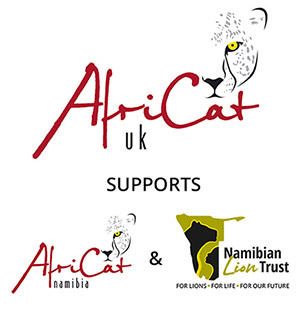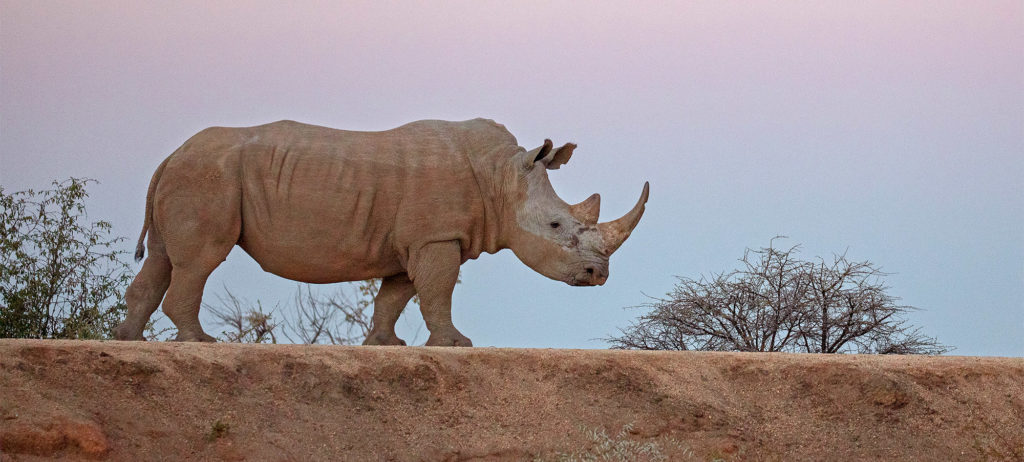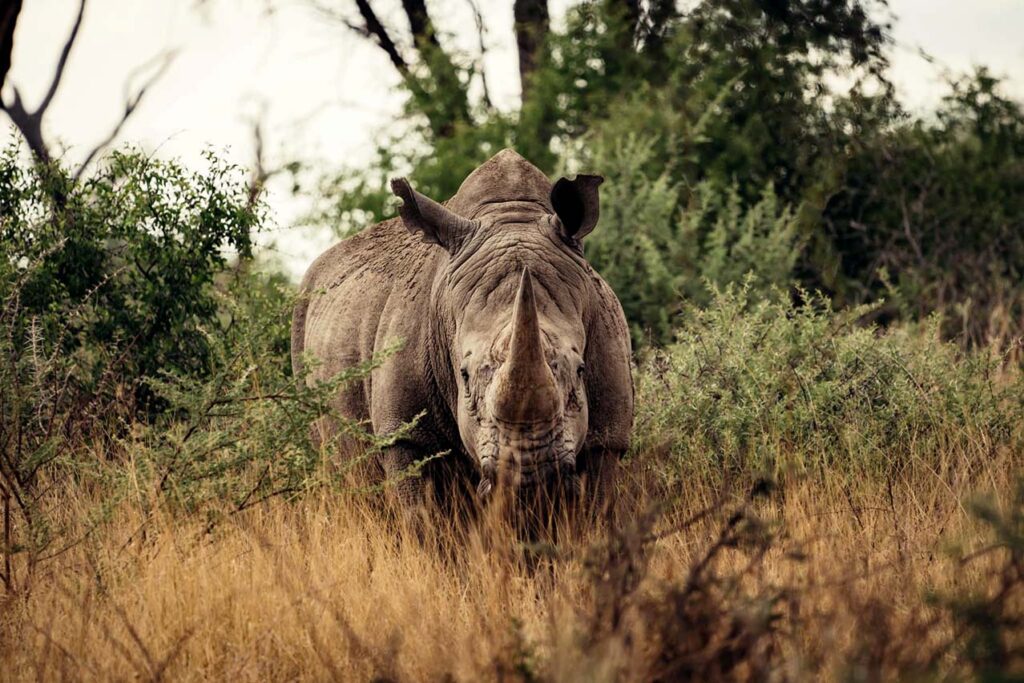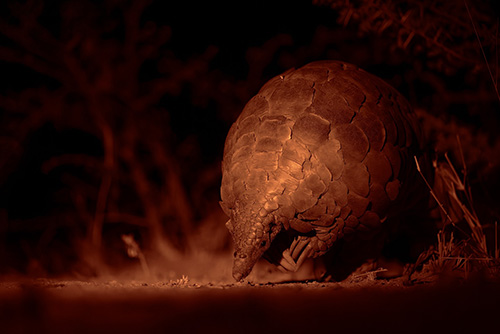STAY IN TOUCH WITH OUR BI-MONTHLY AFRICAT UK NEWSLETTER
AFRICAT UK UPDATES
World Rhino Day 22nd September
Welcome to awareness days.
AfriCat UK’s interest is in ways to educate, help and promote the conservation of endangered species especially those found in Namibia. World Day’s provide an opportunity to explore the issues facing these species in Africa, Namibia and across the planet.
Together we can make a difference by supporting research, providing education on the issues, helping local communities and protecting the land. This allows nature to thrive and ecosystems recover which in turn gives those at risk of extinction a chance to live.
Namibia has two of the 5 species of Rhino the White and the Black.
The White Rhinos are predominately grazers and like to live in herds. They are the largest rhino species and the most numerous but sadly poaching is still at a rate of slightly over one per day.
Black Rhino are predominately browsers and like more bushy, scrub habitat. They are critically endangered and tend to live solitary lives. That said a baby rhino spends several years with its mum.
World Rhino Day 22nd September
Welcome to awareness days.
AfriCat UK’s interest is in ways to educate, help and promote the conservation of endangered species especially those found in Namibia. World Day’s provide an opportunity to explore the issues facing these species in Africa, Namibia and across the planet.
Together we can make a difference by supporting research, providing education on the issues, helping local communities and protecting the land. This allows nature to thrive and ecosystems recover which in turn gives those at risk of extinction a chance to live.
Namibia has two of the 5 species of Rhino the White and the Black.
The White Rhinos are predominately grazers and like to live in herds. They are the largest rhino species and the most numerous but sadly poaching is still at a rate of slightly over one per day.
Black Rhino are predominately browsers and like more bushy, scrub habitat. They are critically endangered and tend to live solitary lives. That said a baby rhino spends several years with its mum.
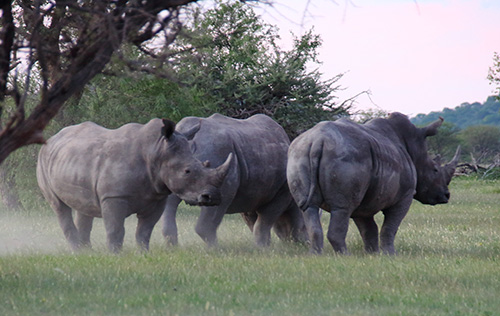
Namibia holds one of the last remaining free roaming populations of black rhino in a very special desert habitat. Save the Rhino Namibia have been monitoring this group for years and have fascinating history of individuals and know that female rhinos will greet and spend time with their grown-up offspring. Here the rhino browses on some interesting plants including a euphorbia that is toxic to most animals and the endemic welwitschia plants.
Threats facing Rhino
A major and very serious threat is poaching. The horn of a rhino is thought by some to have medicinal properties or possessing something made of horn carries status. It does not have medicinal properties and is made of the same material as our nails. Often baby rhinos are left orphaned and in great distress as they have lost the protection of their mother. The trade in horn is illegal but persists as money can be made by the criminals. Reducing demand in key countries is a strategy being used to help stop the poaching. The Lion Guards of the Namibian Lion Trust are now working alongside the other members of their communities who play their part in helping to protect black rhino. However, lions are more mobile and have a bigger range than black rhino in this terrain.
Habitat loss and fragmentation is another reason for declining numbers. Human development has cut up spaces where rhinos used to roam. Increased livestock numbers are competition for grazing, so rhinos find it hard to mix and find mates or establish a home range to survive in. Namibia is less affected by human encroachment than other African counties, but fragmentation does happen. Any area of land has a natural balance of the number of grazers and browsers it can hold. Fenced areas like Etosha National Park (despite its size) mean that animal numbers need to be monitored to keep the overall balance and health of the ecosystem intact. This means rhino numbers need to be managed and monitored. Excess rhinos are relocated to other parks or private reserves.
Conflict and corruption in areas where law enforcement has become difficult – particularly in war zones, where there is political instability or corruption – rhinos may have less on the ground protection and poachers often take advantage of this. Thankfully in Namibia this is not a major problem. However, temptation is hard to resist if life is tough and one is offered what seems a large sum for information or tracking skills. Most rhino populations these days are monitored by a range of means from eyes on the ground, camera traps to very sophisticated surveillance systems at considerable cost.
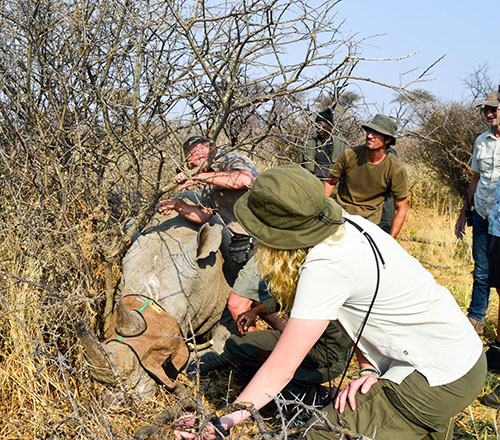
The Okonjima Nature Reserve is home to a small number of rhinos who have special trackers keeping an eye on them.
After a fight between two males over territory, a naturally occurring phenomena, it was noticed that one rhino suffered an eye injury. This was monitored over the following weeks as intervention is not undertaken lightly with set criteria needing to be met.
On this occasion, as the eye did not improve and the rhino was suffering, the vet was called in and performed an amazing operation. Part of the rival’s horn was found embedded in the eye socket. The rhino pictured here is now on the road to recovery. You can read more here.
The AfriCat Foundation and Pangolins
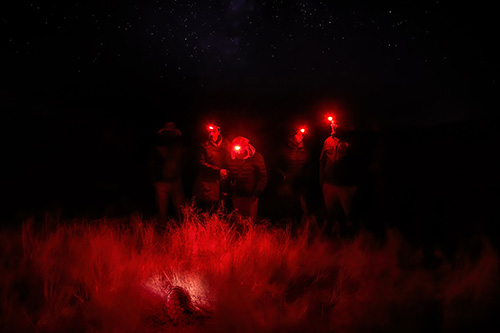
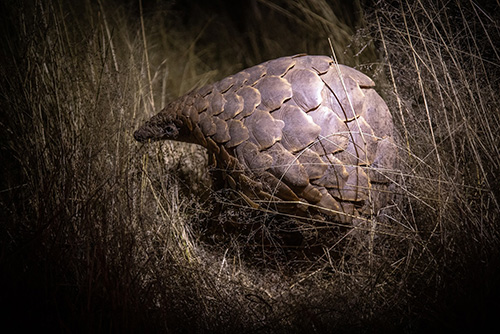
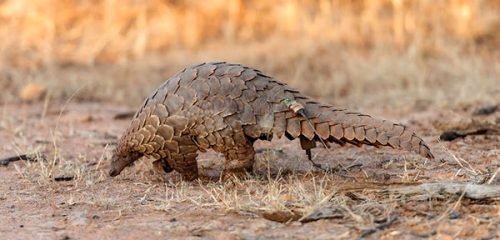
The Okonjima Nature Reserve is home to a wide range of interesting species, one little known resident is a scaly anteater known as the Temminck’s ground pangolin (Smutsia temminckii) or ground pangolin. These animals are predominantly nocturnal which makes studying them difficult, especially in areas with high concentrations of predators. This is why the African pangolin species (there are three others) has been under researched, but this is changing.
Research undertaken on the Okonjima Nature Reserve has found for example some pangolins will forage during the day! GPS trackers are now small enough to be fitted to pangolins which together with trail cameras have allowed researchers scope to gather more information about these fascinating creatures. A visit to Okonjima can provide a rare and wonderful experience of ‘walking with a pangolin’. Learn more and watch this video.
Pangolins are a keystone species who provide a variety of valuable services to the ecosystem directly impacting many other species. Firstly, it is estimated pangolin consume approximately 70 million ants and termites per year, which in turn provides a service to those animals feeding on plants targeted by the insects.
As reported in “Illegal trade in Pangolins in Namibia:” it is estimated that approximately N$600 million per year can be saved in crop loss due to the service provided by pangolin consuming ants and termites- a useful point in the fight against illegal poaching and trafficking of pangolins – as they are the most trafficked mammal in the world.
Pangolin are burrowing animals, which play important roles within ecosystems by functioning as ecosystem engineers. This results from their turning over of the soil during burrowing and feeding which can help aerate the soil and lead to an increase in plant germination.
Traditionally in Africa, pangolin and their scales are moderately used for bushmeat and muti, but now there is a rising demand from Asian markets. China and Vietnam view pangolin as a delicacy and their cultures also believe pangolin scales and body parts to have healing powers in traditional Chinese medicine. A pangolin scale is viewed (in parts of Asia) like that of rhino horn, despite it being made from the same material as our own fingernails and hair.
Another large threat pangolin face in southern Africa is electrocution by electrified fencing, which is why at the Okonjima Nature Reserve the bottom wires on all fencing throughout the reserve has been raised.
Pangolins feature in 10 years of Remembering Wildlife the latest stunning book in this series.
This new book in addition to Pangolins references previously featured species (lion, cheetah, leopard, tiger, wild dogs, elephants, rhino, bears and great apes). The books have magical images donated by photographers and are put together to support conservation efforts of theses endangered animals.
The Remembering Lion Book donated funds to the Namibian Lion Trust for their work in the field of lion conservation.
A Date for your Diary – 8th October 2025 is the launch of this new book. This takes place at London’s Royal Geographical Society and online. It features keynote speakers Lisa Hywood of Tikki Hywood Foundation, award-winning photographer Will Burrard-Lucas and founder Margot Raggett MBE. You can order tickets here for both options
Thank You Blair Drummond Safari Park for your support of the Namibian Lion Trust.
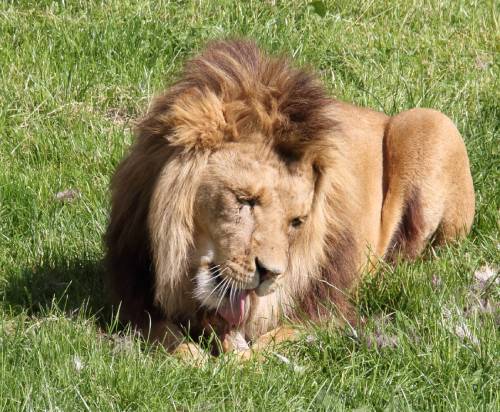
The keepers and staff of Blair Drummond Safari Park select charities to work with through their Link to the Wild programme. The team on site give talks and find other ways to engage members of the public about the plight of the rare and endangered animals they can see in the park.
The number of lions across Africa have plummeted. Habitat loss and fragmentation of their range means there are just half the lions roaming Africa than there were 30 years ago. In fact, there are now thought to be now more white and black rhinos than lions living wild in Africa.
Thanks to the dedication and hard work of the staff at Blair Drummond together with the generosity of the visitors the Nambian Lion Trust is the very grateful recipient of £2,200. A ROAR of appreciation and thanks to everyone from the lions and the Lion Guards in Namibia.
If you are passing the Safari Park or planning a trip to the Stirling area, then book a visit.
Namibian Lion Trust T-shirts designed by Leading London Fashion Designer, Daniel James
The Namibian Lion Trust are super-excited to announce a ground-breaking initiative in wildlife conservation.
Today we are launching a unique range of specialist designer clothing based on the fusion of the core values of Fashion, Rock ‘n’ Roll and Conservation, and designed from the outset in support of the Namibian Lion Trust.
Leading London Fashion Designer, Daniel James, has very kindly designed a unique range of clothing incorporating specialist features that combine style with practicality, functionality with flair.
All profits/proceeds come directly to us at the Namibian Lion Trust.
Namibian Lion Trust T-shirts designed by Leading London Fashion Designer, Daniel James
World Rhino Day is a day of awareness for all five rhino species and the work being done to save them by rhino experts and advocates around the world.
Okonjima Nature Reserve is home to a small number of White Rhino, which are a treat to see in their natural habitat. Those staying at Okonjima can arrange to visit them, in certain circumstances this may be on foot.
White Rhinos are struggling as they continue to be poached for their horn, which is nothing more than what your nails are made of. Really sadly some people still hold onto a belief that it has healing properties – it does not. As the horn has value on the black market these magnificent creatures are still slaughtered and worse still have their horns cut off with chain saws and then left to die.
One of Daniel’s many celebrity clients is Ronnie Woods of the Rolling Stones! Daniel designs all of Ronnie’s stage outfits and Ronnie has very kindly donated one of his specially-commissioned Lion artworks to be printed on a one-off T-shirt for our unique use. – All proceeds come directly to us at the Namibian Lion Trust.
Ronnie has been supporting conservation efforts for many years and we are very grateful for his support with this project.
With Christmas around the corner one of these specially designed t-shirts or sweatshirts would make a lovely present.
Please follow the link below to go directly to Daniels James’s website to see the whole collection he has designed alongside, as well as the very special Ronnie Woods Lion artwork T-shirt or use the QR code.
Shop now and support the work of the Namibian Lion Trust
For more information about The Namibian Lion Trust please visit their website.
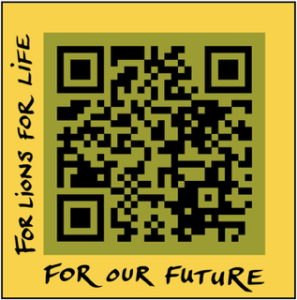
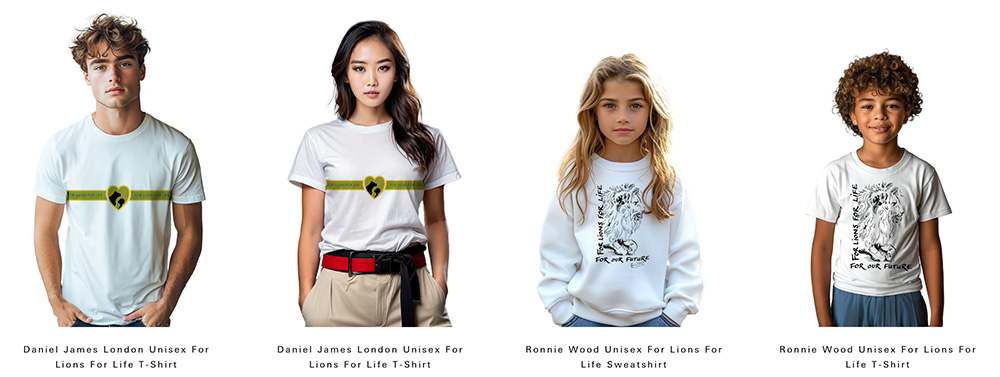
Thank you from the AfriCat UK Board
We have been delighted to see the funds coming in from a range of sources.
The AfriCat UK online shop has increased its range of goods and includes mugs, cards water bottles as well as a range of other items. It is worth checking out from time to time as things do get added. If there is something particular you are after, do email janet@africat.co.uk with the detail of what you would like and it may be possible to design it for you. Please allow plenty of time.
The new Namibian Lion Trust merchandise from London Fashion Designer Daniel James has been well received and sales have been steady especially in the run up to Christmas. They do make excellent presents for all ages.

Easyfundraising continues to be popular and is an excellent way to help AfriCat UK without costing you a penny, please spread the word and if you have not signed up yet please do. The shop you purchase the goods from give us a small percentage of the time cost.
We have been delighted to see that people have been making donations via Benevity which is a corporate platform that enables people across the world to donate to charities of their choice.
We are very grateful to be remembered by a recent friend of AfriCat UK in their will and will ensure their generosity is used to good advantage.
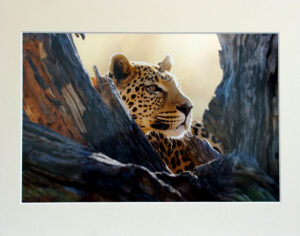
There is still a supply of prints taken by Chris Packham you can purchase.
Check out the details in the shop section of the website.
In 2025 we hope to expand and increase the ways people can support AfriCat UK and The Namibian Lion Trust. Any suggestions and ideas are most welcome.
AfriCat UK
The AfriCat UK Board.
The three current Trustees of AfriCat UK are Frank Horan as Chairman, Charlotte Shipton and Janet Widdows. In addition, we have keen supporters of the work in Namibia who assist the Board with various tasks and our longstanding Patrons and Ambassadors. The Board is keen to hear from anyone who would like to help with fundraising, tasks associated with running the charity or those willing to join the Board.
Any offers of help are most welcome, please contact either Frank or Janet or Charlotte
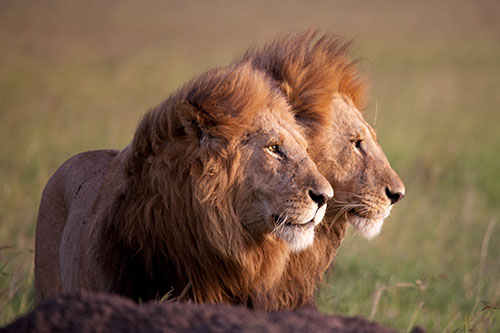
AfriCat UK’s Vision
To contribute towards the conservation efforts of the Namibian charities who work to conserve suitable habitat and environments where carnivores and endangered species can thrive and survive. This work will involve education, research and working with local communities.
Misson Statement
To promote the need for conservation of the natural world for all in Namibia. To work with local charities supporting their projects and initiatives. This will include but not be limited too, awareness raising of issues in the UK, Namibia and the wider world; supporting local educational initiatives; fundraising; promoting visits to the region and Okonjima; encouraging and sharing relevant research work; working to reduce human wildlife conflict and to involve local communities with all relevant activities.
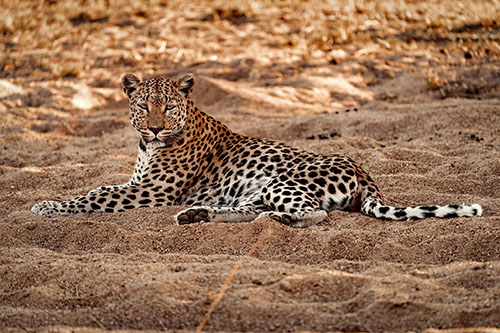
Contacting AfriCat UK
correspondence address: 5 Brackendale Way, Reading, Berkshire RG6 1DZ
phone: landline 0118 935 1681 (please leave a message if no reply)
email address: support@africat.co.uk has replaced info-uk@africat.org but anything sent to the old email is being forwarded and we will reply.
AfriCat UK board members can be contacted with their first name followed by @africat.co.uk
website: www.africat.co.uk
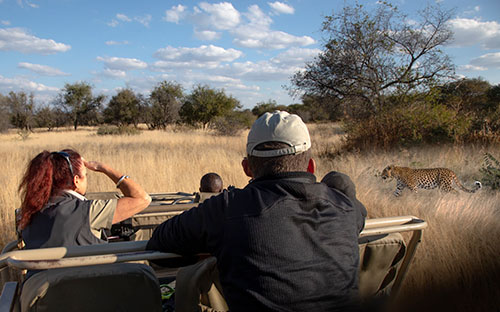
AfriCat - Behind the Scenes
The AfriCat Foundation welcomes Okonjima guests to come behind the scenes to learn first-hand about the work of the Foundation.
The AfriCat Behind The Scenes programme is available for groups of guests between 4 to 8 pax booked into the Okonjima Bush Camp or Luxury Villa for at least three nights on a fully inclusive basis.
This experience will give you a deeper insight into our research projects, such as the Brown Hyaena, Pangolin, the Leopard and other endangered species. Guests will be able to see and participate in AfriCat work that can be scheduled for the time of the visit such as re-collaring as well as the option of meeting the “AfriCat ambassador carnivores” that are in the care of AfriCat.
For more information please visit: AfriCat Behind the Scenes
Since 2014, AfriCat UK (UK Charity Commission Number 1120026) has supported The AfriCat Foundation and The Namibian Lion Trust (Formerly AfriCat North). AfriCat UK raises funds for the various programs that have been developed by the Namibian charities to assist in research of key species, research of solutions to Human Wildlife Conflict, and the education of local communities in Namibia.
We have successfully funded research that has assisted in the better understanding of the Cheetah, Pangolin, Leopard, Lion, and Hyenas. AfriCat UK have funded the building of a school for local communities to improve the link in conservation and education for future generations. Many world renowned veterinary clinicians have based their research and resultant doctorates on the animals and facilities that can be found at the two charities in Namibia that we continue to fund. The importance of this research allows for wide-spread conservation initiatives that impact species globally.

